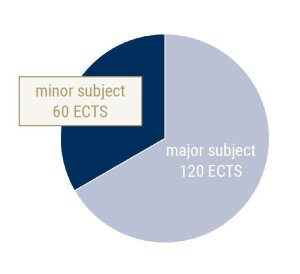- Faculty of Social and Behavioral Sciences
Slavonic Studies—Eastern Slavonic Studies
- Degree
- Bachelor of Arts
- Supplement to degree
- minor in a multi-subject bachelor’s programme
- Admission restriction
- without admission restriction (without NC)
- Duration
- 6 Semesters
- Credits/ECTS
- 60
- Teaching language
- German
- Tuition fee
- None
- Semester contribution
- € 305,05
- Start of studies
- Winter semester
- Part-time possible
- Yes
- Institutions
- Faculty of Arts
- Institute of Slavic Studies and Caucasus Studies
Programme content
In the Slavonic Studies programme, you will acquire sound basic knowledge and skills relating to the language, literature and culture of the respective Slavic countries in their historical and contemporary manifestations. In the major subject of Eastern Slavic Studies, you will study Russian and another Slavic language (Czech or Polish or Bulgarian or Serbian/Croatian). You will study Russian in the supplementary subject of Eastern Slavic Studies. You can also study Slavonic Studies-Southern Slavonic Studies with a focus on Southern Slavonic Studies (core or supplementary subject) or Western Slavonic Studies (supplementary subject) in Jena.
Structure
Multi-subject bachelor’s programme
Picture: Sophie BartholomeThe Bachelor's degree is the first professional qualification. The standard period of study|regular programme length is six semesters in total, during which various forms of courses (e.g. seminars, lectures or tutorials) are offered for the individual modules.
A multi-subject Bachelor's degree consists of a major subject with 120 credit points (abbreviation: LP / 1 LP = 30 hours of attendance, preparation and follow-up work|follow-up activity, coursework and examinations) and a supplementary subject with 60 LP.
The core and supplementary subjects of Slavic Studies (East, South and West Slavic Studies) cannot be combined with each other.
Why study in Jena?
- Jena Slavic Studies presents itself as a subject of medium size, which represents the entire Slavia in an exemplary manner and differentiates itself in various perspectives according to language, literature or region. The degree programme offers the opportunity to combine philological and practical focuses. There are many points of contact with other subjects.
- Internationally recognised special features of the Jena South Slavic Studies focus are its Balkanological and cultural studies profile and the interdisciplinary cooperation within the framework of South-Eastern European Studies.
- First-year students with no previous knowledge of Russian are given the opportunity to take part in special practical language exercises (pre-semester preparatory course) before the start of their first semester.
- The University of Jena maintains numerous contacts with partner universities in Central, Eastern and South-Eastern Europe, where it is possible to stay abroad.
What can you do after your studies?
Career opportunities:
In combination with core or supplementary subjects such as Intercultural Business Communication, Political Science, Law, German Studies, Communication Science, Intercultural Music and Event Management, etc., the following opportunities are available:
- Employment with internationally active companies,
- in the press and publishing industry
- in tourism,
- in radio and television editorial offices and
- in supranational, national or non-governmental facilities|institution|(structural) units and organisations that deal in particular with Russia, the CIS countries, Poland and the Czech Republic.
Downloads and links for the degree programme
What are we looking for in prospective students?
- a special interest in the Eastern European or East-Central European area
- Relevant language skills are advantageous
Admission requirements
-
University entrance qualification
A university entrance qualification, such as a general secondary school leaving certificate, is required for admission onto the study programme.
More information on university entrance qualifications can be found here.
-
Language requirements
Russian or another Slavic language (depending on specialization) and a non-Slavic foreign language; proof by the time of registration for the Bachelor's thesis at the latest
Contacts
Ernst-Abbe-Platz 8
07743 Jena
Google Maps site planExternal link
Ernst-Abbe-Platz 8
07743 Jena
Google Maps site planExternal link
Opening hours:
nach Vereinbarung
Bachstraße 18k
07743 Jena
Telephone hours:
Mondays and Fridays (9:00 – 11:00)
Wednesdays (13:00 – 15:00)
The ASPA is primarily responsible for students in the Faculty of Social and Behavioural Sciences, the Faculty of Arts and Humanities, and the Faculty of Theology.
Postal address:
Akademisches Studien- und Prüfungsamt
Fürstengraben 1
07743 Jena
Room 302
Ernst-Abbe-Platz 8
07743 Jena
Google Maps site planExternal link
University Main Building / SSZ
Fürstengraben 1
07743 Jena
Google Maps site planExternal link
Office hours:
We offer consultations in person, by telephone, and via Zoom. You can make an appointment by calling us on +49 3641 9-411111 (Mondays to Fridays from 9:00 to 11:00) or outside these office hours on +49 3641 9-411200. You can also use our remote help desk.
Consultation hours:
Mondays, Tuesdays, Thursdays and Fridays (9:00 to 12:20), Tuesdays (14:00 to 18:00), and Wednesdays and Thursdays (14:00 to 16:00).
Video chat: To the video chat – Zoom Videochat ZeitenMondays to Fridays (12:30 to 13:00) Password ZSB2020 Data protection informationpdf, 101 kb
University Main Building, Room E065
Fürstengraben 1
07743 Jena
Google Maps site planExternal link
Opening hours:
Information Desk (UHG; Room E0.65)
Mondays (10:00 – 12:00)
Tuesdays (13:00 – 15:00)
Wednesdays (10:00 – 12:00)
Thursdays (13:00 – 15:00)
Fridays (10:00 – 12:00)
You can also use our remote help desk at
www.uni-jena.de/service-ssz
or send us your enquiries by post.
Telephone hours:
Mondays to Fridays
(9:00 – 11:00)
Postal address:
Friedrich-Schiller-Universität Jena
Studierenden-Service-Zentrum
07737 Jena
University Main Building
Fürstengraben 1
07743 Jena
Google Maps site planExternal link
